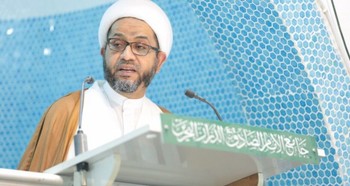
RNA – A Bahraini cleric, Hujjat al-Islam Muhammad Sanqour, during his speech in Imam al-Sadiq Mosque, condemned the direct and official interference of the Bahraini government in the administration of religious affairs.
His Eminence said that certain official government agencies are interfering is in religious discourse over political issues, adding that the Holy Quran encourages us to “enjoin the good and forbid the wrong” and recommends us to follow the truth.
The Bahraini Shi’a scholar explained that attempts to create laws which restrict religious discourse from critique and reform are violations of the laws and commands of the Holy Quran.
Hujjat al-Islam Sanqour added: “Limiting the discourse of ‘enjoining the good and forbidding the wrong’ means to restrict elements of religious discourse.”
He pointed out that Islam is not divisible or something that one can pick or choose elements from. He said that implementation of the duty of enjoining the good and forbidding the wrong only requires permission from God and government authorities do not have the right to interfere in this respect.
The Friday prayers’ leader of Diraz explained that religious scholars are at the forefront of the implementation of this divine command and added that its importance cannot be overlooked.
Following Friday prayers, hundreds of people held demos in Diraz as well as in the village of Sitrah, south of the capital to voice their resentment at the continued detention of the leading opposition figure and Shi’a cleric Shaykh Ali Salman and other political activists.
111/112